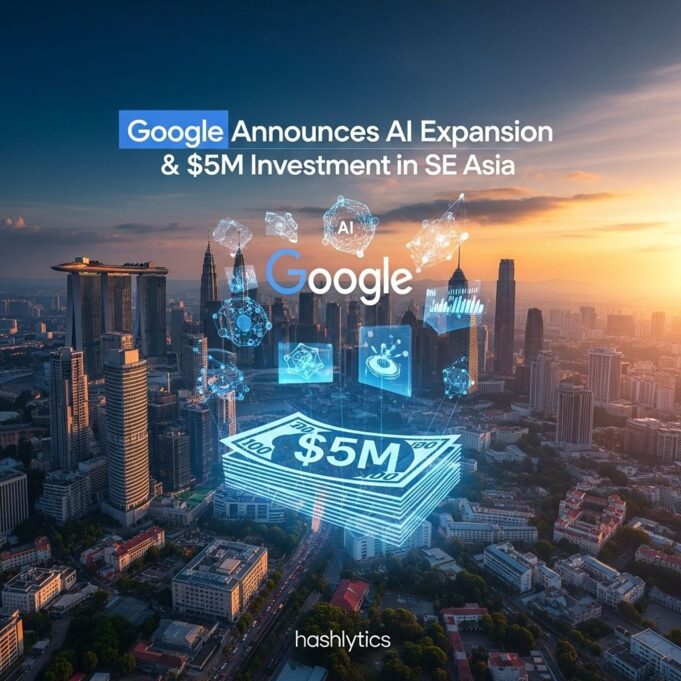Google is significantly expanding its presence and influence in Southeast Asia through a series of AI-powered initiatives, app updates, and security enhancements, backed by a substantial $5 million investment. These developments are poised to reshape the region’s digital landscape, impacting sectors from healthcare and agriculture to everyday conveniences and future data security.
At the ASEAN Business and Investment Summit (ABIS), Google unveiled a suite of AI programs designed to accelerate Southeast Asia’s digital transformation. The region, where 70% of the population already engages with generative AI on a weekly basis, stands to gain an estimated US$270 billion boost to its economy. Google recognizes Southeast Asia’s technological enthusiasm and rapidly developing digital infrastructure as fertile ground for significant progress.
Google DeepMind’s AlphaFold, a tool that predicts protein structures, has become an essential resource for over 85,000 researchers in Southeast Asia. In Malaysia, it is being utilized to accelerate the development of treatments and vaccines for melioidosis, a serious infectious disease. Researchers in Singapore are employing AlphaFold to identify early indicators of Parkinson’s disease, potentially leading to more proactive and personalized healthcare strategies.
Beyond healthcare, Google DeepMind’s Agricultural APIs are expanding their reach into Malaysia, Vietnam, and Indonesia. These APIs provide real-time data on crop types, field sizes, and planting/harvesting schedules. Such detailed information is crucial for promoting sustainable agriculture, particularly in the face of increasingly unpredictable climate conditions. Google.org is further supporting this effort with a US$1.5 million investment in TransitionZero, a climate analytics nonprofit. This funding will facilitate the development of an AI-powered tool for clean energy planning, assisting Malaysia and Singapore in making informed decisions regarding energy investments and fostering a greener future.
Education and digital literacy are central to Google’s strategy in Southeast Asia. The AI Ready ASEAN initiative, a collaboration between Google.org and the ASEAN Foundation, has already provided over 800,000 young people, educators, and parents with fundamental AI skills. The AI Class ASEAN online platform has attracted over 14,000 users in just two months, offering accessible, self-paced training. Furthermore, Google’s Gemini Academy has trained more than 290,000 teachers across Indonesia, Malaysia, Thailand, Vietnam, and the Philippines, integrating AI tools into classrooms at the foundational level.
Acknowledging the challenges associated with rapid digital adoption, Google.org has committed US$5 million to promote youth digital wellbeing in Southeast Asia. This investment supports nonprofit organizations that offer practical resources for teenagers, parents, and teachers to encourage healthy relationships with technology. Since 2020, Google.org’s contributions to social impact organizations in the region have exceeded US$40 million in cash, US$80 million in product donations, and 20,000 volunteer hours, reaching nearly 4 million learners.
Google’s influence extends to everyday conveniences. Google Maps now offers a “Save parking” feature, enabling users to record the precise location of their parked car, along with notes and timer settings. This seemingly simple addition can be particularly helpful in large shopping centers or unfamiliar urban environments.
Chrome on Android devices now automatically revokes notification permissions for websites that exhibit low user engagement but send a high volume of notifications. This reduces notification overload and provides users with greater control over their online experience.
In the realm of security, Google Cloud is proactively addressing the potential threat posed by quantum computing. It is offering preview support for post-quantum Key Encapsulation Mechanisms (KEMs) in its Key Management Service (Cloud KMS). This measure is designed to protect against “Harvest Now, Decrypt Later” attacks, where malicious actors store encrypted data today with the intention of decrypting it in the future when quantum computers become powerful enough to break current encryption methods. However, Google Cloud acknowledges that organizational readiness for this threat remains limited.
Overall, Google’s recent initiatives demonstrate a commitment not only to participating in Southeast Asia’s digital transformation but also to actively shaping it. From empowering millions with AI skills and resources to improving daily life and safeguarding future data security, Google’s impact is widespread and significant. The pace of change is accelerating, and Southeast Asia is experiencing a surge in momentum.



